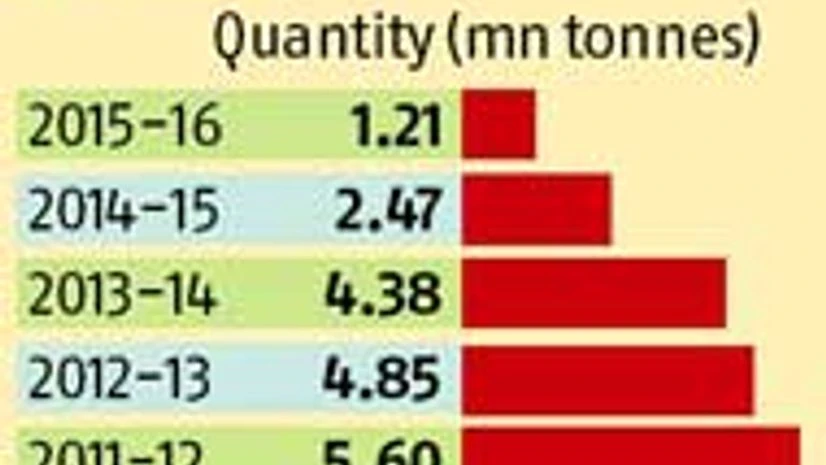India is steadily running out of the $70-billion oilmeals market due to lack of seeds for crushing and emergence of alternative supply sources.Seed crushing mills have sought relaxation in government policies for India to regain its place in the global oilseed market.
Until three years ago, India used to contribute over five per cent to the global oilmeals trade. Oilmeals exports, however, have declined by a staggering 94 per cent to 7,737 tonnes in May 2016 from 121,339 tonnes in May 2015. Most seed crushing mills have halved their operating capacity to reduce losses of around Rs 1,500 per tonne.
“India will soon go out of global oilmeals market if the trend in its exports continues,” said BV Mehta, executive director, Solvent Extractors’ Association of India (SEA).
India’s oilmeals exports have been in free fall from 4.4 million tonnes in 2013-14 to 2.5 million tonnes in 2014-15 and 1.2 million tonnes in 2015-16. Trade sources estimate less than 1 million tonnes of oilmeals exports during 2016-17.
A minimum support price for oilseeds sets the floor on prices mills pay to buy seeds from farmers, resulting in expensive meal production. Since vegetable oil prices are subdued, crushing units face negative parity. Thus mills import refined oil for blending and repacking instead of crushing local seeds.
Iran, facing global economic sanctions that prompted it to turn to India for bird/animal feed requirements, used to be the largest importer of Indian oilmeals until 2013-14.
Once the sanctions were lifted it has almost stopped import of oilmeals from India. Iran now meets over one million tonnes of its oilmeals requirement from cheaper alternative sources like the US, Argentina and Brazil. Meals supply from these countries costs $100-150 lower than that from India.
Japan used to import half a million tonnes of oilmeals from India till four years ago. It has now started importing oilmeals extracted from genetically modified (GM) seeds. Since India produces meals from non-GM seeds, their extraction is costlier.
"Therefore, the government needs to change its policy for oilseeds and allow sowing of GM. Import of GM seeds should also be allowed for crushing locally. Otherwise, India's exports of meals would come to standstill," said Kanubhai Thakkar, Managing Director, Gokul Refoils and Solvent Ltd (producer of Gokul brand oils).
Import of oilseeds in India is currently non-remunerative due to levy 30 per cent tax. Also, import of GM oilseeds is not allowed in India.
"GM seeds fetch at least three times more output. Allowing GM plantings in oilseeds would not only bring higher output for farmers but also make cost of oil and oilmeal productions lower as farmers would be able to sell their seed output at lower than MSP in case markets turns unfavourable," said Thakkar.

)
